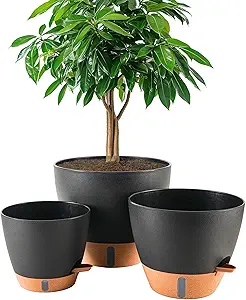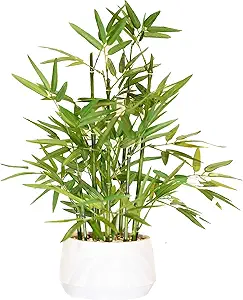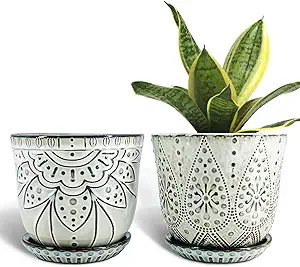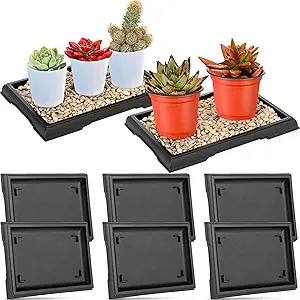You’re likely searching for ways to bring more positive energy into your home something calming, beautiful, and beneficial to your well-being. In the ancient practice of feng shui, the right plant does more than decorate; it balances energy, promotes flow, and nurtures harmony in your surroundings. Whether you’re looking to refresh your bedroom, energize a bathroom, or simply create a more peaceful space, understanding which plants support these intentions is essential.
The 8 best feng shui plants for the home, according to the pros, include the snake plant, pothos, peace lilies, money plant, orchid, rubber plant, philodendron, and areca palm. These indoor plants are known to attract positive energy, promote balance, and enhance well-being in any space.
The best feng shui plants aren’t just visually appealing they’re thoughtfully chosen to align with natural elements and the principle of chi, the life force believed to influence every aspect of your life. From air-purifying peace lilies to the ever-resilient pothos, each plant can help you nurture a home that reflects balance, clarity, and growth.

Large Plastic Planter with Drainage Holes, Water Level Indicator & Deep Reservoir, Modern Decorative Flower Pots (Black).
In this post, you’ll discover expert-recommended options like the snake plant, money plant, and other indoor plants that are said to attract positive energy, improve your well-being, and support the flow of abundance. Read on to explore the top eight choices, why they matter, and how to place them correctly according to the pros.
Peace Lilies to Pothos: Nurture Calm in Bathroom & Bedroom

Peace lilies to pothos two of the most trusted companions in your journey to create a peaceful atmosphere in your bathroom or bedroom. These two stand out among the best plants for indoor serenity, both visually and energetically. A peace lily, with its graceful leaves and elegant white flowers, not only purifies the air but also embodies the water element in feng shui, helping to remove stagnant energy and improve emotional flow. This plant brings a natural softness to humid spaces and can support your health and well-being by offering clean air and a calming presence.
Pothos, on the other hand, is perfect for dimly lit bedrooms. It’s resilient, easy to care for, and can trail beautifully from shelves or hanging planters. According to feng shui principles, this plant brings movement and lightness helping to direct energy in your home and lift the mood in even the most overlooked corners. When placed thoughtfully, especially in the southwest zone, these plants help attract harmony and relaxation.

Luxury Artificial Bamboo in White Pot for Home, Office, Kitchen, Counter Top, Indoor Decor, Money Tree, Lucky Tree.
Other supporting plants like calathea, sansevieria, or the classic zz plant further enhance the tranquility of your home. Each choice connects to a specific element, creating a balance that allows you to recharge, reflect, and invite fortune into your life. Whether you’re a new plant parent or a seasoned plant lover, these feng shui plants for good offer more than beauty they symbolize growth, resilience, and peaceful transformation.
How Feng Shui Plants Bring Positive Energy to Every Room

Incorporating Feng Shui plants for good is not merely a decorative trend it’s a thoughtful practice rooted in the principle of balancing nature’s energy within your home. This ancient Chinese practice guides how you can use specific plants to harmonize your surroundings, create a nurturing atmosphere, and invite positivity into every room.
The Principle of Energy Flow Through Plants
Feng Shui operates on the principle that everything in your environment carries a type of energy, or chi. When you select and place indoor plants mindfully, they help redirect stagnant energy and replace it with vibrant, life-giving force. Plants such as peace lilies are particularly revered for their ability to absorb indoor toxins while uplifting the mood of any space. Their graceful leaves and white flowers symbolize peace, fortune, and emotional balance ideal for the bedroom or living room.
Creating Abundance in Living Areas
Your living space is where energy gathers and flows freely. Incorporating a variety of greenery especially those known for their prosperity-enhancing qualities can help manifest abundance in your life. Peace lilies, with their elegant blooms, are a perfect centerpiece in a well-lit corner, bringing a soothing presence. Areca palms and ficus trees are also effective in enhancing this chi, with their generous canopies that add volume and life.
The Nurturing Power of Plants in Personal Spaces
In areas like your bedroom or home office, the goal is to nurture mental clarity, calm, and emotional restoration. Plant lovers often turn to peace lilies here, not only for their minimal care requirements but also for their spiritual symbolism. They align with the water element, encouraging emotional flow and reducing the effects of stagnant or disruptive energy. For those who love trailing vines, a pothos can gently trail across shelves or frames, visually softening sharp angles and offering a steady, nurturing energy.
A Thoughtful Choice for Health and Well-Being
For many plant parents, the home is a sanctuary of health and well-being. Whether you’re new to this lifestyle or a seasoned indoor gardener, choosing the right plants matters. Peace lilies, again, stand out for their versatility, thriving in various light conditions and blooming throughout the year. With consistent care, they nurture not only the space but also your relationship with nature.

Indoor-Outdoor Large Round Succulent Orchid Flower Pot (Smoked Gray, Inner-pots not Larger Than 5 Inch).
Designing a Harmonious Environment
When thoughtfully placed, Feng Shui plants do more than beautify they influence your life direction, emotions, and aspirations. Try placing a peace lily in the wealth corner of your home to symbolize fortune, or use a succulent in the entryway to ground the flow of incoming energy. If you’re a plant lover seeking subtle yet powerful additions to your indoor garden, these choices will help you cultivate both beauty and intention.
Conclusion
Bringing feng shui plants for good into your home is more than an aesthetic decision it’s a meaningful way to nurture balance, improve your surroundings, and uplift your emotional space. From the air-purifying strength of peace lilies to the gentle resilience of pothos, each plant contributes to a thoughtful flow of energy that reflects the principle of harmony within the ancient Chinese practice of feng shui.
Whether placed in a quiet corner, a lively living room, or your home office, these plants support health and well-being, helping you release stagnant energy and attract fortune, abundance, and calm. As you carefully choose and position your plants be it a graceful areca palm, a heartening flower, or a steadfast succulent you are participating in a natural dialogue between nature and space, one that has the power to transform your everyday environment.
Now is the time to nurture your living spaces with intention. Explore our curated collection of feng shui-approved indoor greenery and bring positive energy in your home today. Begin your journey toward clarity, peace, and growth plant lovers and plant parents alike, your sanctuary awaits.

Drip Tray Plastic Plant Water Catcher Plant Saucers for Indoors and Outdoors Cactus,Succulents,Bonsai Tree,Stone Not Included (7.8 x 5.5 Inch).
